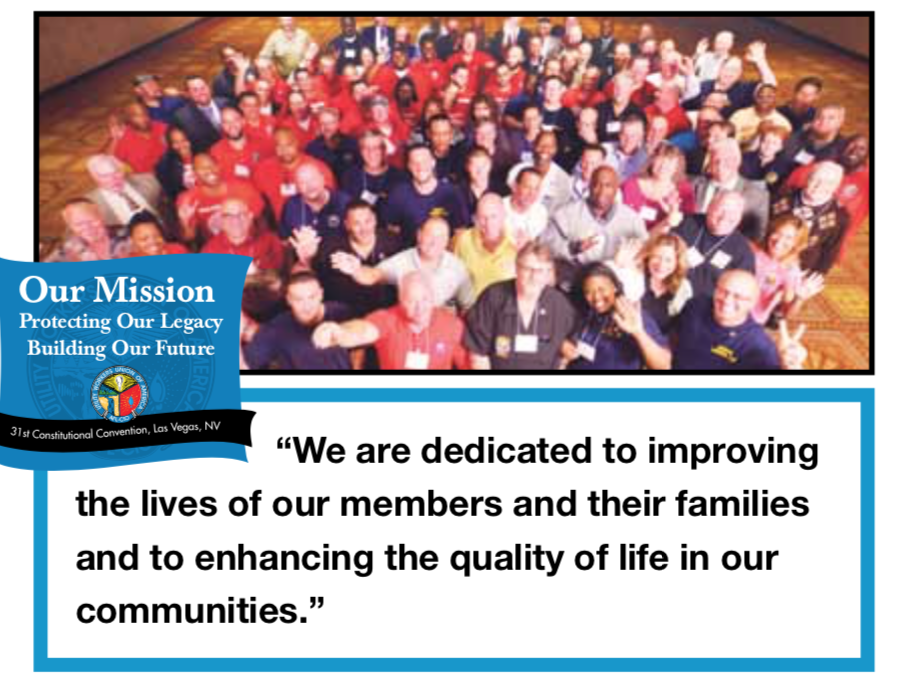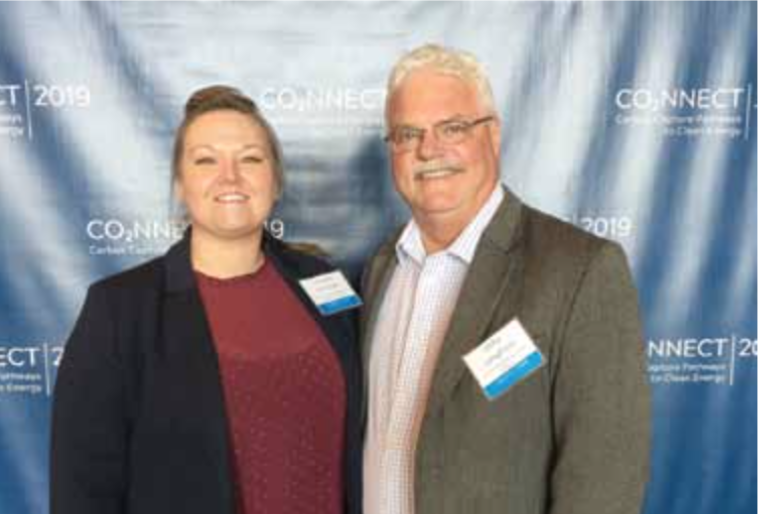Hundreds of UWUA Delegates and Alternate Delegates who represent the entire membership will come together July 24-27 for the 31st Constitutional Convention. Under the banner of “Our Mission: Protecting Our Legacy, Building Our Future” they will chart a course for the union to follow for the next four years.
The convention proceedings are not to be taken lightly. With the retirement of UWUA President Mike Langford and Executive Vice President Steven VanSlooten, delegates will elect new leadership for the National Union. This, and other decisions taken, will impact each and every member, their families, and the communities they serve well into the future.
Labor under attack
At no other time in the union’s 75-year history have UWUA members, and working people throughout the country, faced such an attack on their rights and their well being as they do today. The Department of Labor, the National Labor Relations Board, the Occupational Safety and Health Administration, and other federal agencies that govern workplaces are all stacked with anti-worker, anti-union, pro-corporate officials who are doing all they can to protect the interests of the rich.
Corporations, and those who do their bidding, are relentlessy attacking working people, destroying the middle class that built this great nation. Unions are the only institution standing between total control of the country by the wealthy and privileged and the upholding of the U.S. democracy.
 With this in mind, the convention theme was chosen carefully and purposefully to act as a guide for the difficult work ahead. The utility workers who formed the union in 1945 knew clearly what they wanted the mission of the union to be. Fortunately for utility workers today, their clarity of purpose is as relevant now as it was then.
With this in mind, the convention theme was chosen carefully and purposefully to act as a guide for the difficult work ahead. The utility workers who formed the union in 1945 knew clearly what they wanted the mission of the union to be. Fortunately for utility workers today, their clarity of purpose is as relevant now as it was then.
The mission, as written by those whose blood, sweat and tears built the UWUA, is embedded in the preamble of the UWUA Constitution. It reads:
“The UWUA, AFL-CIO is an organization of members united by the belief in the dignity and worth of workers and by an understanding of the necessity and value of the services we provide to the public for their health and well-being. We are dedicated to improving the lives of our members and their families and to enhancing the quality of life in our communities.
“We are an organization of men and women of every race, religion, age, and ethnicity, who are committed to a society where all workers and their families live and work with dignity; where there is an economic and political mandate for a more equitable distribution of the nation’s wealth for those performing useful service to society; where workers have a collective voice and power in the workplace; where economic well being is achieved for our members and all workers, where work is satisfying and fairly rewarded.”
Utility Workers have a strong sense of history. They honor the words and deeds of those who came before them and use them to guide their path into the future. “Our Mission: Protecting Our Legacy, Building Our Future.” will focus the National Union’s work going forward.
Fighting back
Coming together at July’s historic convention couldn’t happen at a more important moment. This is a pivotal time for working people, the union, and the nation. Utility Workers are on the front lines of a rapidly changing world.
UWUA members are the best trained, highest skilled, safest, most productive workers in the world. Keeping the lights on, the water flowing, and the gas burning, providing life’s necessities and making the American Dream a reality for members, their families, and the public.
By protecting the legacy of the Utility Workers of the past, the National Union will successfully build a future that will benefit everyone.

Wherever they may fall on the spectrum, politicians unfortunately tend to approach climate change as a political issue rather than in a logical, technical manner. This limits policy solutions to short-sighted, ideologically-driven approaches. Overlooking climate proposals that consider all options available to reduce CO2 emissions only results in inadequate national energy policy.
Making energy jobs sustainable
For this reason, the UWUA is proud to be part of a recent centrist effort to take a technology-neutral, science-driven approach to lowering emissions via legislation introduced recently by Senator Tina Smith (D-MN) and Congressman Ben Ray Lujan (D-NM). The bill, titled the Clean Energy Standard Act of 2019, circumvents the politics around which technology should play the greatest role, and instead focuses on acknowledging a role for all power generation sources.
 By adopting a national clean energy standard that is achievable using a variety of technologies, this bill adopts a net zero emissions philosophy calculated to protect the legacy of utility workers by preserving existing jobs and ensuring that future energy jobs are sustainable over the long term. This acknowledges that carbon emissions will continue to happen, but that carbon removal technology can and will compensate for them, creating space for both existing and future generation facilities.
By adopting a national clean energy standard that is achievable using a variety of technologies, this bill adopts a net zero emissions philosophy calculated to protect the legacy of utility workers by preserving existing jobs and ensuring that future energy jobs are sustainable over the long term. This acknowledges that carbon emissions will continue to happen, but that carbon removal technology can and will compensate for them, creating space for both existing and future generation facilities.
Equally as important, this approach rejects the zero-sum thinking inherent in imagining a world without carbon emissions at all. Human civilization is deeply complex and will always have a carbon cost, no matter our best intentions.
Carbon capture technology could broadly decarbonize much of the existing power generation fleet including both natural gas and coal-fired plants as well as heavy industries such as steel, cement, and ethanol manufacturing. In fact, the U.S. is already at the forefront of developing carbon capture and storage systems, with 16 of the 22 largest commercial projects built over the past half-century.
Carbon capture is a ‘must have’
Beyond this, according to the science, attempting to keep global warming in check without robust, global use of carbon capture systems would increase overall global by nearly 140% according to the Intergovernmental Panel on Climate Change (IPCC). It’s not a ‘nice to have’ it is a ‘must have’ if we want to win this fight.
Utility workers are accustomed to solving problems every day in a ‘hands-on’ manner and know that the path toward protecting the UWUA legacy for the future lies in practical science, not politics.
Achieving net zero emissions avoids the zero-sum thinking that has guided climate policy to this point and can bring scientific solutions to a scientific problem.
Overlooking the arsenal of climate action tools already within our reach would be as damaging as not doing anything at all.
Photo caption:
UWUA President Mike Langford and Local 127 Financial Secretary Chauffe Schirmer at the Carbon Capture Pathways to Clean Energy Conference in Jackson Hole, WY in May. The union is an active member of the Carbon Capture Coalition supporting commercial adoption of carbon capture technology.

Over the last decade, the UWUA has put in place the building blocks to ensure success going forward. The creation of the Power for America Training Trust (P4A) and the National Health and Welfare Fund are proven successes, providing training and benefits at a national level never seen before.
The national committees — Human Rights, Young Workers, Women’s, and Safety — are working together to protect and strengthen current members and bring the benefits of UWUA membership to unorganized utility workers.
The addition of Directors of Government Affairs and Communications expands the union’s ability to protect jobs and communicate effectively with members and the public.
In addition, the UWUA continues to builds relationships with other unions and union-supported organizations that share members’ values and goals.
To top it all off, in May, the UWUA signed a strategic affiliation agreement with the International Brotherhood of Boilermakers, Iron Ship Builders, Blacksmiths, Forgers and Helpers (Boilermakers) that calls for the two unions to join together for mutually beneficial strategies that leverage both organizations’ strengths.
While the affiliation agreement is not a merger of the two unions, it calls for the UWUA and the Boilermakers to share in areas and opportunities that naturally align, such as special projects, industry programs and infrastructure, resources and other cooperative efforts.
This historic action positions both unions to better defend the jobs of current members and take advantage of synergies to ensure those created in the fast-changing utility industries are good union jobs.

Along those lines, earlier this year, UWUA National and local representatives from four states — Massachusetts, Michigan, New Jersey, and New York — participated in the American Wind Energy Association’s (AWEA) annual conference. AWEA is the national trade association for the U.S. wind industry.
Wind generation and other renewable energy sources are taking off and the UWUA’s P4A has developed a Department of Labor registered apprenticeship to train members to become renewable specialists. This first of its kind training program puts the union at the forefront of training, operating, and maintaining wind turbines, solar farms, and battery storage units.

And when it comes to offshore wind, the UWUA is there as well, working with industry, government and affected communities to ensure that jobs created in this industry are good union jobs.
“All of our planning and work over the last number of years is paying off,” says UWUA President Mike Langford. “I feel the union is in a great position to benefit from the major changes taking place in our industries. We have the membership, the leadership, and the tools we need and are building our future.”


